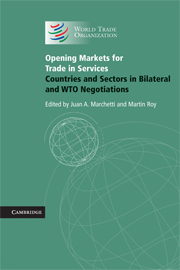Book contents
- Frontmatter
- Contents
- List of figures
- List of tables
- List of boxes
- List of contributors
- Foreword
- Acknowledgments
- Disclaimer
- Summary and overview
- PART I From Policy to Negotiations
- PART II Multilateral and Bilateral Negotiations on Services: Overall Perspectives
- 2 Services liberalization in the WTO and in PTAs
- 3 PTAs in services: friends or foes of the multilateral trading system?
- PART III Challenges, Issues and Opportunities in Services Sectors
- PART IV Country Experiences with Services Trade
- Index
- References
3 - PTAs in services: friends or foes of the multilateral trading system?
Published online by Cambridge University Press: 05 December 2011
- Frontmatter
- Contents
- List of figures
- List of tables
- List of boxes
- List of contributors
- Foreword
- Acknowledgments
- Disclaimer
- Summary and overview
- PART I From Policy to Negotiations
- PART II Multilateral and Bilateral Negotiations on Services: Overall Perspectives
- 2 Services liberalization in the WTO and in PTAs
- 3 PTAs in services: friends or foes of the multilateral trading system?
- PART III Challenges, Issues and Opportunities in Services Sectors
- PART IV Country Experiences with Services Trade
- Index
- References
Summary
Preferential trade agreements are proliferating around the globe. By the end of July 2007 380 PTAs had been notified to the WTO. Only 142 of these agreements were concluded between 1948 and 1994 – the period from the establishment of the GATT to the end of the Uruguay Round. The remaining agreements entered into force thereafter. To put it provocatively, it could be said that, just after WTO members pledged their commitment to a non-discriminatory trading system by concluding the most far-reaching of all multilateral trading rounds, they went off to sign a plethora of discriminatory trading pacts.
A fashionable feature of the “new generation” PTAs has been the inclusion of a trade in services component. By July 2007 fifty-eight such services PTAs were in force (they are counted separately by the WTO), of which only five pre-date the conclusion of the Uruguay Round (seefigure 3.1). The rising interest in services trade agreements reflects underlying technological and policy developments. Not too long ago, economic textbooks equated services with non-tradables. Rapid ICT advances have enabled cross-border trade in many service activities, however – from auditing accounts to educating people. In addition, many governments have transferred the provision of infrastructure services to the private sector, expanding the scope for foreign investment in services.
The proliferation of PTAs marks an important shift in the governance of world trade. Some economists view these agreements as inherently undermining the multilateral trading system and being ultimately harmful to the cause of free trade.
- Type
- Chapter
- Information
- Opening Markets for Trade in ServicesCountries and Sectors in Bilateral and WTO Negotiations, pp. 113 - 148Publisher: Cambridge University PressPrint publication year: 2009
References
- 2
- Cited by



